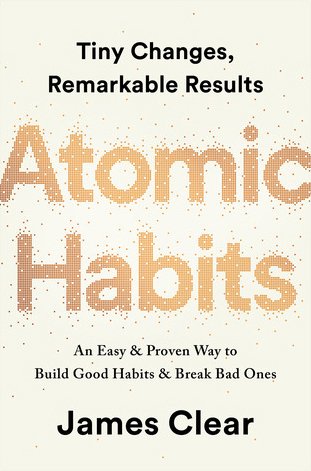‘Atomic Habits’ on one sheet
October 9, 2025 by
Max van IJsselmuiden
If you're time-poor or just want the actionable parts, this should get you started. The book goes deeper with stories and science, but these principles are enough to start building better habits.
Back in April 2025 when I read the popular book ‘Atomic Habits’ by James Clear, a friend had told me "this could have been one sheet". When I was reading, partially biased because I had put in the effort to read the whole book, I initially disagreed.
Looking back at it now, I must say her remark was very close to the truth.

Atomic Habits: An Easy & Proven Way to Build Good Habits & Break Bad Ones
James Clear
·
Psychology
Because the concepts that are explained are so simple, the book feels slightly too long to make its point, however, the point it does make is very powerful and helpful. Perhaps it is so powerful because of its simplicity. It’ll definitely help me avoid my bad habits and steer towards my good habits. Recommended!
In any case, the tips in the book are useful. It's just more extensive than it has to be. Here's my cheat sheet for the book. Save some time and improve your habits and life!
The four laws of behavior change
Make it obvious
Design your environment so the cue is visible. Example: Put your sports shoes by the door. This works both ways: out of sight, out of mind.
Make it attractive
Pair the habit with something you enjoy. Example: Listen to your favorite podcast only while at the gym. Your brain craves rewards.
Make it easy
Reduce friction. Don't start with "run 5km". Start with "put on sports clothes". The 2-minute rule: scale any habit down to something you can do in two minutes. Often the first 2-minutes are enough to get started and do more anyway.
Make it satisfying
Give yourself immediate rewards. Example: Track your habits. Reward yourself for streaks. What gets rewarded gets repeated.
Breaking a bad habit? Invert these laws. Make it invisible, unattractive, difficult, and unsatisfying.
A few more bits worth knowing
Systems over goals
Winners and losers have the same goals. The difference is the system. Focus on the daily process, not the end result.
1% better compounds
Small improvements add up. 1% better each day = 37x better after a year.
Identity-based habits
Don't aim to "read more". Aim to "become a reader". Every action is a vote for the type of person you want to become.
Never miss twice
Missing once is an accident. Missing twice is the start of a new habit: the habit of not doing it.
That’s the cheat sheet. Good luck, hope this helps!
Did you like this post?
Newer
October 13, 2025
Apple won by building a system where every device seamlessly works together, from auto-unlocking my Mac to my doorbell appearing on the nearest screen. The lock-in is real, but the integrated experience is worth it.
Older
September 22, 2025
Ever notice how you suddenly see something everywhere right after learning about it - like a specific car model or new word? This article explores the fascinating cognitive bias behind this phenomenon and how understanding it can help you make better decisions.
Want to stay tuned?
‘Atomic Habits’ on one sheet
October 9, 2025 by
Max van IJsselmuiden
If you're time-poor or just want the actionable parts, this should get you started. The book goes deeper with stories and science, but these principles are enough to start building better habits.
Back in April 2025 when I read the popular book ‘Atomic Habits’ by James Clear, a friend had told me "this could have been one sheet". When I was reading, partially biased because I had put in the effort to read the whole book, I initially disagreed.
Looking back at it now, I must say her remark was very close to the truth.

Atomic Habits: An Easy & Proven Way to Build Good Habits & Break Bad Ones
James Clear
·
Psychology
Because the concepts that are explained are so simple, the book feels slightly too long to make its point, however, the point it does make is very powerful and helpful. Perhaps it is so powerful because of its simplicity. It’ll definitely help me avoid my bad habits and steer towards my good habits. Recommended!
In any case, the tips in the book are useful. It's just more extensive than it has to be. Here's my cheat sheet for the book. Save some time and improve your habits and life!
The four laws of behavior change
Make it obvious
Design your environment so the cue is visible. Example: Put your sports shoes by the door. This works both ways: out of sight, out of mind.
Make it attractive
Pair the habit with something you enjoy. Example: Listen to your favorite podcast only while at the gym. Your brain craves rewards.
Make it easy
Reduce friction. Don't start with "run 5km". Start with "put on sports clothes". The 2-minute rule: scale any habit down to something you can do in two minutes. Often the first 2-minutes are enough to get started and do more anyway.
Make it satisfying
Give yourself immediate rewards. Example: Track your habits. Reward yourself for streaks. What gets rewarded gets repeated.
Breaking a bad habit? Invert these laws. Make it invisible, unattractive, difficult, and unsatisfying.
A few more bits worth knowing
Systems over goals
Winners and losers have the same goals. The difference is the system. Focus on the daily process, not the end result.
1% better compounds
Small improvements add up. 1% better each day = 37x better after a year.
Identity-based habits
Don't aim to "read more". Aim to "become a reader". Every action is a vote for the type of person you want to become.
Never miss twice
Missing once is an accident. Missing twice is the start of a new habit: the habit of not doing it.
That’s the cheat sheet. Good luck, hope this helps!
Did you like this post?
Newer
October 13, 2025
Apple won by building a system where every device seamlessly works together, from auto-unlocking my Mac to my doorbell appearing on the nearest screen. The lock-in is real, but the integrated experience is worth it.
Older
September 22, 2025
Ever notice how you suddenly see something everywhere right after learning about it - like a specific car model or new word? This article explores the fascinating cognitive bias behind this phenomenon and how understanding it can help you make better decisions.
Want to stay tuned?
